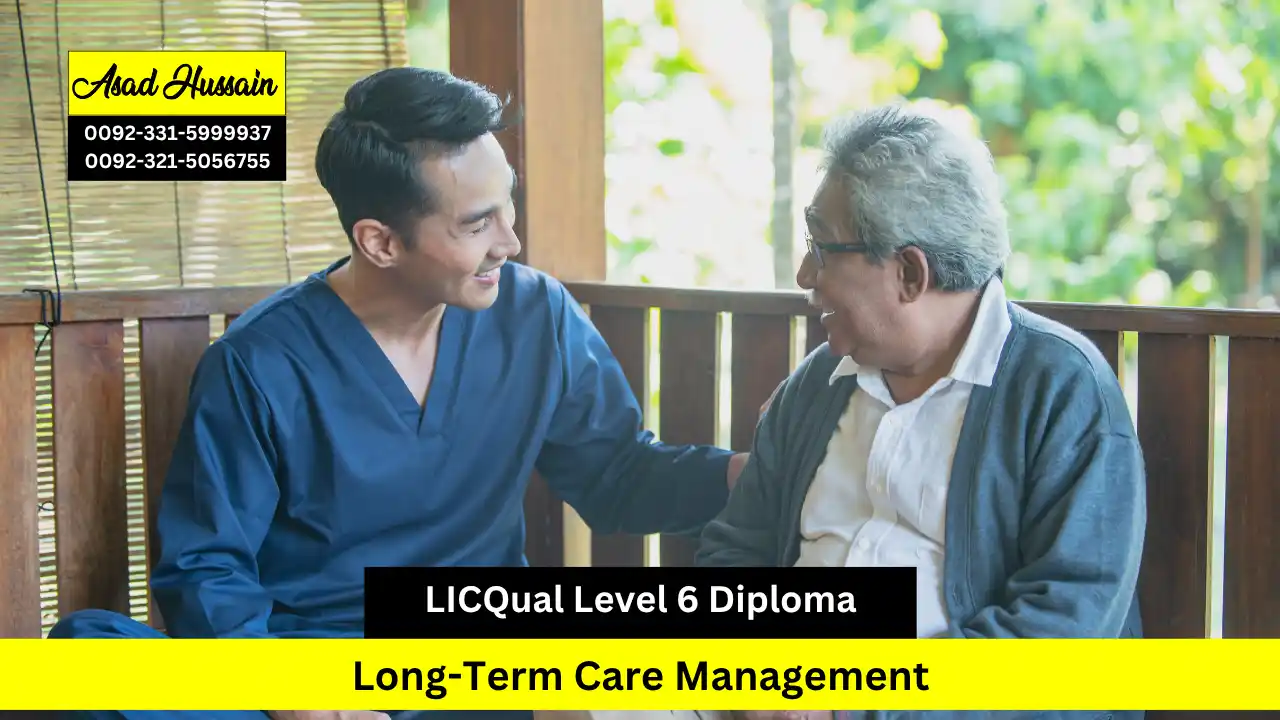The LICQual Level 6 Diploma in Long-Term Care Management is an internationally recognized qualification designed to prepare professionals for leadership and management roles in the growing field of long-term healthcare and social care services. As populations age and the demand for quality care rises globally, the need for skilled care managers who can ensure compassionate, ethical, and efficient service delivery has never been greater. This qualification provides learners with the expertise to manage care facilities, lead multidisciplinary teams, and implement best practices that enhance the lives of individuals requiring long-term care.
LICQual Level 6 Diploma in Long-Term Care Management focuses on developing advanced knowledge and skills in long-term care leadership, healthcare quality management, and care coordination. Learners will explore essential concepts such as patient-centered care, ethical decision-making, health policy, and resource optimization. Through a practical and analytical approach, the course equips participants to manage operations in nursing homes, assisted living facilities, and community care organizations while maintaining compliance with healthcare regulations and quality standards.
One of the key strengths of the LICQual Level 6 Diploma in Long-Term Care Management lies in its comprehensive coverage of both the clinical and administrative dimensions of care. Learners will gain the ability to evaluate healthcare policies, improve organizational performance, and develop frameworks for sustainable and high-quality care delivery. The program integrates evidence-based management principles with leadership strategies that prioritize patient safety, dignity, and well-being.
By completing this diploma, learners will acquire critical thinking, problem-solving, and decision-making skills necessary to handle complex challenges in long-term healthcare settings. The course emphasizes the importance of communication, collaboration, and leadership in creating inclusive and supportive care environments. Learners will be prepared to foster teamwork, resolve ethical dilemmas, and ensure continuous service improvement in their organizations.
The LICQual Level 6 Diploma in Long-Term Care Management also prepares professionals to navigate the evolving landscape of healthcare technology and policy. Participants will develop proficiency in healthcare operations management, risk assessment, and strategic planning, enabling them to adapt to emerging challenges in long-term and geriatric care. The qualification encourages innovation, data-driven decision-making, and a proactive approach to managing change within health and social care organizations.
Upon completion, graduates will be equipped to take on leadership roles such as Care Home Managers, Long-Term Care Coordinators, Health Services Directors, and Senior Care Administrators. The program not only enhances professional competence but also supports career advancement in both public and private health sectors. With a strong emphasis on ethical leadership, policy compliance, and quality improvement, this diploma empowers learners to deliver compassionate and effective long-term care that meets the needs of aging and vulnerable populations worldwide.
Program Highlights
Mandatory Units
- Principles of Long-Term Care Management
- Health and Social Care Policy and Governance
- Leadership and Staff Management
- Strategic Planning and Resource Management
- Quality Improvement and Risk Management
- Ethics, Safeguarding, and Resident-Centred Care
The LICQual Level 6 Diploma in Long-Term Care Management is an internationally recognized qualification designed for individuals who aspire to lead, manage, and innovate within long-term healthcare and social care settings. As global populations age and healthcare systems evolve, the demand for qualified leaders who can deliver compassionate, ethical, and efficient long-term care continues to grow. This program equips learners with the management expertise, clinical insight, and leadership skills needed to ensure high-quality care, patient dignity, and sustainable healthcare operations.
Age Requirements
- Applicants must be at least 18 years old at the time of enrolment.
- Candidates under 18 years may be considered in exceptional cases with written parental or guardian consent and evidence of maturity and readiness for higher-level study.
Educational Requirements
- A high school diploma or equivalent qualification is the minimum educational requirement for admission.
- Previous studies in healthcare management, nursing, social care, or health sciences are advantageous but not mandatory.
- Applicants are encouraged to possess a basic understanding of healthcare systems and patient care to effectively engage with course content.
Professional Experience
- While not compulsory, 1–2 years of experience in healthcare, social care, or administrative management is preferred.
- Practical experience in care coordination, facility management, or patient services enhances learners’ ability to apply course concepts in real-life contexts.
- Individuals currently working in nursing homes, long-term care facilities, or rehabilitation centers will benefit from directly integrating leadership and care management principles into their professional practice.
English Language Proficiency
- Learners who have completed previous education in English-medium institutions may be exempt from this requirement.ellence within dynamic healthcare environments.ms that improve service quality and accessibility.and improved patient outcomes in modern healthcare environments.
- Strong English reading, writing, and communication skills are required to successfully complete this diploma.
- International applicants must demonstrate English proficiency through recognized assessments such as IELTS (minimum band score of 5.5) or an equivalent qualification.
Learners who meet these entry requirements will be well-prepared to undertake the LICQual Level 6 Diploma in Long-Term Care Management with confidence and competence. This qualification offers an opportunity to develop advanced management capabilities, strengthen care coordination, and enhance the overall quality of long-term care services. Graduates will emerge as capable leaders ready to oversee healthcare facilities, improve service delivery, and promote dignity, compassion, and excellence in care provision across the long-term healthcare sector.
The LICQual Level 6 Diploma in Long-Term Care Management provides learners with the professional expertise, leadership skills, and ethical understanding required to manage long-term care facilities effectively. This qualification focuses on developing the knowledge and practical competencies needed to deliver high-quality, person-centered care while ensuring compliance with health, safety, and governance standards. The learning outcomes below highlight what learners will achieve upon successful completion of each unit, including the ability to lead teams, manage resources, and improve the overall quality of care services.
Principles of Long-Term Care Management
- Understand the key principles, frameworks, and objectives that define effective long-term care management.
- Evaluate the physical, psychological, and social needs of individuals receiving long-term care to ensure holistic service delivery.
- Develop and implement care strategies that promote patient independence, dignity, and well-being.
- Analyze the challenges associated with managing aging populations, chronic illnesses, and complex care needs.
- Apply evidence-based practices to enhance service quality and operational performance within long-term care settings.
Health and Social Care Policy and Governance
- Demonstrate a thorough understanding of national and international policies guiding health and social care management.
- Evaluate the impact of healthcare legislation, regulatory compliance, and ethical governance on long-term care delivery.
- Develop governance frameworks that promote transparency, accountability, and patient safety.
- Analyze the role of policy-making in shaping health and social care services and their alignment with public health priorities.
- Apply risk management and monitoring systems to ensure adherence to care standards and professional codes of conduct.
Leadership and Staff Management
- Demonstrate effective leadership and decision-making skills in managing multidisciplinary teams in long-term care environments.
- Develop strategies for staff recruitment, retention, and performance evaluation to maintain high standards of care.
- Apply principles of motivation, communication, and teamwork to foster a positive workplace culture.
- Address ethical dilemmas and conflicts in leadership through reflective and solution-oriented approaches.
- Implement leadership practices that encourage continuous professional development and accountability among care staff.
Strategic Planning and Resource Management
- Design and implement strategic plans that align with the organizational goals and healthcare system priorities.
- Analyze financial data, budgeting processes, and resource allocation to ensure cost-effective care management.
- Develop resource optimization strategies that enhance efficiency and sustainability in long-term care facilities.
- Evaluate key performance indicators (KPIs) to assess organizational success and identify areas for improvement.
- Integrate strategic and operational planning to strengthen resilience and innovation in care service delivery.
Quality Improvement and Risk Management
- Understand the principles and processes of quality assurance and continuous improvement in healthcare services.
- Apply audit tools and performance measurement techniques to monitor service effectiveness and patient satisfaction.
- Identify potential risks within long-term care settings and develop proactive risk mitigation strategies.
- Implement quality improvement initiatives that enhance patient outcomes and operational reliability.
- Promote a culture of safety, accountability, and continuous learning within healthcare organizations.
Ethics, Safeguarding, and Resident-Centred Care
- Apply ethical theories and professional standards to guide decision-making in complex care situations.
- Demonstrate an understanding of safeguarding policies, legal responsibilities, and best practices in protecting vulnerable adults.
- Develop communication strategies that promote empathy, respect, and cultural sensitivity in care delivery.
- Implement resident-centered care approaches that prioritize dignity, autonomy, and individual preferences.
- Evaluate ethical challenges and apply moral reasoning to ensure fairness, confidentiality, and trust in care management.
Upon successful completion of the LICQual Level 6 Diploma in Long-Term Care Management, learners will possess the advanced knowledge and professional skills necessary to lead long-term care facilities with integrity, efficiency, and compassion. This qualification empowers graduates to enhance the quality of life for residents, strengthen organizational governance, and ensure sustainable, ethical, and person-centered care delivery across healthcare systems worldwide. globally.nformatics strategy, positioning them at the forefront of the evolving healthcare technology sector.
The LICQual Level 6 Diploma in Long-Term Care Management is an internationally recognized qualification designed for professionals dedicated to managing, improving, and leading long-term care facilities with excellence and compassion. As the global demand for long-term care continues to rise due to aging populations and chronic health conditions, this diploma equips learners with the advanced management, leadership, and operational skills needed to deliver person-centered, safe, and high-quality care. It focuses on the essential aspects of care facility administration, ethical leadership, regulatory compliance, and quality improvement — preparing learners to create sustainable care environments that prioritize resident well-being and dignity.
Long-Term Care Managers and Administrators
- Professionals currently working in or aspiring to manage long-term care facilities, nursing homes, or residential care institutions.
- Managers responsible for overseeing daily operations, staff performance, and compliance with healthcare regulations.
- Individuals seeking to develop the leadership and organizational skills necessary for effective long-term care facility management.
- Administrators aiming to improve care quality, patient satisfaction, and operational efficiency.
- Learners focused on implementing best practices in long-term care management and resident-centered service delivery.
Healthcare Professionals and Practitioners
- Nurses, therapists, and allied health professionals transitioning into management roles within long-term care environments.
- Practitioners aiming to enhance their knowledge of care coordination, team leadership, and patient safety.
- Professionals seeking to apply clinical expertise to management contexts while maintaining compassionate and ethical care standards.
- Learners looking to integrate evidence-based care management techniques into day-to-day healthcare practices.
- Individuals dedicated to fostering collaborative care teams and enhancing communication across multidisciplinary units.
Policy Makers and Care Regulators
- Policy developers and regulators responsible for shaping and overseeing long-term care policies and governance frameworks.
- Individuals working on the design and implementation of policies that promote quality, accountability, and accessibility in care services.
- Professionals seeking to strengthen their understanding of healthcare law, compliance, and ethical care regulations.
- Administrators involved in the development of governance systems that uphold high care standards and resident rights.
- Leaders striving to ensure that long-term care practices align with national and international quality benchmarks.
Supervisors and Departmental Heads
- Supervisors managing staff teams, clinical units, or administrative departments within long-term care settings.
- Department heads seeking to enhance their managerial and leadership capabilities to ensure efficient service delivery.
- Professionals focused on motivating and supporting staff to deliver high-quality, compassionate care.
- Learners responsible for implementing change management strategies and improving workplace culture.
- Managers aiming to integrate performance management and ethical principles into staff development and operational planning.
Quality and Compliance Officers
- Professionals ensuring compliance with health and safety standards, care regulations, and ethical guidelines.
- Individuals tasked with conducting audits, risk assessments, and continuous quality improvement initiatives.
- Managers developing and monitoring performance metrics to enhance resident safety and satisfaction.
- Learners focusing on identifying gaps in care delivery and implementing effective improvement strategies.
- Officers committed to fostering transparency, accountability, and continuous professional growth within long-term care institutions.
Career-Focused Learners and Future Long-Term Care Leaders
- Individuals aspiring to advance their careers in long-term care management, healthcare administration, or social care leadership.
- Learners preparing for senior leadership roles in hospitals, care homes, health ministries, or non-governmental organizations.
- Professionals aiming to progress academically or professionally in healthcare management and care service governance.
- Career-driven individuals seeking to build strong leadership foundations based on ethics, empathy, and operational excellence.
- Learners committed to shaping the future of long-term care by promoting sustainable, high-quality, and resident-focused management practices.
The LICQual Level 6 Diploma in Long-Term Care Management is ideal for those passionate about improving the quality of life for residents in long-term care environments. Graduates of this program will possess the advanced knowledge, managerial expertise, and ethical judgment needed to lead care facilities effectively, ensuring safety, quality, and compassion in every aspect of care delivery. This diploma provides a pathway to leadership roles in healthcare management, aged care administration, and social care governance, empowering learners to make a meaningful impact in the long-term care sector worldwide.ance, and ethical consultancy — empowering professionals to make a meaningful impact on the future of healthcare.






